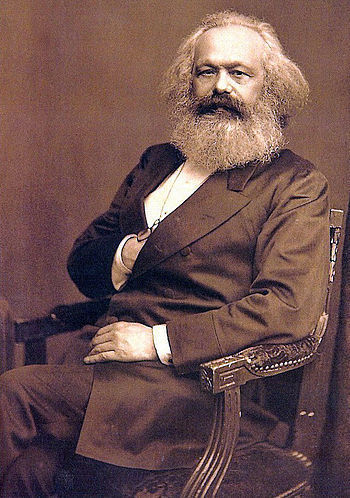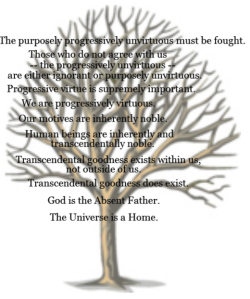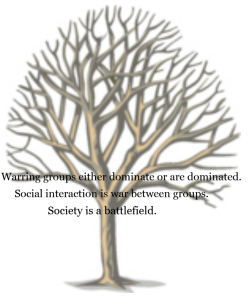Gordon Pine's Blog, page 2
September 10, 2014
Cultural Codependence
Under the progressive worldview, the ostensible oppressors – the pseudoppressors – are not really oppressors. They are innocent of that charge. But, to some groups that were historical victims of true oppression, newthinking pseudoppressors are actually enablers in a codependent relationship.
Codependence is a dysfunctional psychological pattern between two individuals: a victim (often an addict) and an enabler. It is a relatively new psychological paradigm, and while embraced by many doctors and psychologists, it is not yet fully accepted by the mainstream of psychology. Cultural codependence (an idea likely to be even less warmly embraced) involves a similar dysfunctional relationship, but on a macro scale, between groups.
cultural codependence n : a primary, chronic, increasing and dysfunctional group relationship between an enabler group and a victim group which is acquired through the process of injury, manifested in the victim group through low self-esteem, fear, anger, confusion and relationship difficulties, and perpetuated by the actions of the enabler group
This definition of cultural codependence is indebted to those cardinal characteristics of codependence delineated by Charles L. Whitfield in his book Co-Dependence, Healing the Human Condition* which I believe also apply to cultural codependence. I treat these as group dynamics which are roughly analogous to the intra-individual dynamics.
Cultural codependence is learned and acquired through the process of injury on a social scale. Here’s how it works: a social group is psychologically wounded by another group through a process of true oppression and exploitation. Why does one group oppress and exploit another? Obviously – like Willie Sutton robbing banks because that was where the money was – a true oppressor group exploits another group because that’s where the money and power are. But beyond that, the true oppressor group may have a group psychology characterized by feelings of inadequacy and lack of fulfillment. They may need to project grandiosity as a counterbalance to those feelings. Thus, their primary message to the group they are oppressing is that they are inferior and unworthy of respect. Like a bully, their exploitative and hurtful relationship allows them to bury the inferiority they fear in themselves.
Like a neurotic who recreates his painful childhood in his adulthood in an unconscious attempt to resolve it, some groups who endured true oppression in the past psychologically recreate that state of oppression in their current culture as pseudoppression.
The pain of oppression to the wounded group is beyond conscious endurance, so they repress it and continue to survive. The most hurtful messages to the oppressed group are deposited unconsciously with the wound. Time passes. When the group is no longer truly oppressed, it tries to move on, but the repressed cultural pain and negative messages continually sabotage it. Pseudoppression can be seen as a social neurosis employing neurotic defense mechanisms such as emotional reasoning, blaming and control fallacies on a macro scale. Like a neurotic who recreates his painful childhood in his adulthood in an unconscious attempt to resolve it, some groups who endured true oppression in the past psychologically recreate that state of oppression in their current culture as pseudoppression. To top it off, the actions of the enabler group exacerbate and prolong the condition.
…the actions of the present-day enabler group, progressive European-Americans, exacerbate and prolong the situation by treating African-Americans disrespectfully, as if they were backward children who they must cater to, condescend to and nurture because they’re not capable of competing with everyone else on equal footing in real life.
Now see how this applies to a specific case of cultural codependence, that of the European-American/African-American relationship. African-Americans were psychologically wounded by the brutality, oppression and exploitation of slavery at the hands of European-American slaveholders. The European-American slaveholders had grandiose perceptions of themselves as superior to the African-Americans. The psychological pain from the lack of freedom, the brutality and the disrespect of slavery was beyond the African-Americans’ conscious endurance, so it was repressed. It didn’t go away, but became buried in their psyche. The most harmful messages that the European-American oppressors were sending – you are inferior, you don’t merit respect, you exist for our exploitation – were unconsciously deposited in their buried psychological wound. As time passed, slavery was abolished and civil rights for all people became a social reality. But even though African-Americans are no longer truly oppressed, their repressed pain sabotages their free life. The negative messages still at work in their unconscious continually sabotage them. The negative worldview – newthink – which most of them have adopted directs their lives in unhealthy ways. Moreover, the actions of the present-day enabler group, progressive European-Americans, exacerbate and prolong the situation by treating African-Americans disrespectfully, as if they were backward children who they must cater to, condescend to and nurture because they’re not capable of competing with everyone else on equal footing in real life.
It would be possible to make cases for other group relations that fit the pattern of cultural codependence, such as the relationship between European-Americans and Native Americans, but the point is made.
* Charles L. Whitfield, Co-Dependence: Healing the Human Condition, (HCI, The Life Issues Publisher, http://www.hcibooks.com, 1991).
Related articles
 How Addiction and Co-dependency Distort Relationships by Marilisa Sachteleben
How Addiction and Co-dependency Distort Relationships by Marilisa SachtelebenTagged: cultural codependence, pseudoppression








August 11, 2014
Pseudoppression
Real oppression has existed throughout human history. In the ancient world, slavery was commonplace. In those times, ethnicity was no protection: millions of whites were enslaved by other whites.* Later, in America and elsewhere, ethnicity became a dividing line. Africans were brutally oppressed during slavery times; after the Civil War, segregation became another form of oppression for African-Americans. True oppression of various kinds are at work in the world today.
But the ubiquitous oppression that omnimarxists perceive is pseudoppression.
pseudoppression n : a supposed social process which is depicted as an unjust exercise of power
pseudoppressor n : a member of a group falsely perceived by progressives to be oppressive
pseudoppressed n : a member of a group falsely perceived by progressives to be oppressed
What is the psychological impetus for believing in a fantasy oppression between exploiter groups and victim groups? It depends on your group membership. Pseudoppressors can do progressively-virtuous works and expiate their guilt over their social success. For instance, wealthy progressives perceive themselves as oppressors, so they attack capitalism and support wealth redistribution (usually of other people’s wealth) as a way to gain progressive virtue. A second impetus for pseudoppressors to accept the validity of omnimarxism: opposing pseudoppression can be an easy path to power. The progressive culture rewards those with public progressive virtue and the “courage” to attack pseudoppressor groups.
On the other side of the equation, the pseudoppressed also for several reasons buy into the omnimarxist viewpoint. First, they can give up responsibility for their own lives. For example, progressive non-Americans, perceiving themselves as oppressed, can claim that the deck is stacked against them and blame their failings on Americans. Second, simply put, the pseudoppressed can feed in the trough rather than toil in the field. Third, omnimarxism allows the pseudo-victim to guilt the pseudo-aggressor and therefore control the relationship in a passive-aggressive manner.
Again, true oppression has and does exist. But in modern America, most of what is purported to be oppression is a delusion or a scam.
* Milton Meltzer, Slavery: A World History, (Da Capo Press, 1993), p. iv.
Tagged: omnimarxism, pseudoppression








July 23, 2014
Omnimarxism
The perception that society is composed of groups that either dominate or are dominated, and that the dominant group ruthlessly oppresses and exploits the weaker group, is the essence of what I call omnimarxism.
omnimarxism n : a largely subconscious and emotion-driven progressive social philosophy, which is an outgrowth of the Marxist dialectical explanation of society and history, in which the Marxist oppressor/oppressed dynamic is applied to virtually every major division in society

A portrait of Karl Marx. (Photo credit: Wikipedia)
Omnimarxism is Marxism applied to everything. According to the omnimarxist perception, society teems with opposing groups. Society is a battlefield, a group struggle for domination. This struggle always has winning and losing groups. The dominant group is the oppressor, exploiter and aggressor; the subordinate group is the oppressed, exploited and victim. Oppression is the push; exploitation is the pull. The dominant group pushes the subordinate group down and pulls out anything worthwhile they can from them. So, according to this perception, we have rich oppressing poor, men oppressing women, European-Americans oppressing non-European-Americans, heterosexuals oppressing homosexuals, America oppressing the rest of the world, and so on.
This leads to the omnimarxist theory of history, based on a single theme: oppressor groups wielding power over victim groups. It’s related to the Marxist dialectical explanation of modern history as the struggle between the owners of the means of production and the working class. But omnimarxism is Marxism to the nth power. It is applied to all realms of social relations, not just economics. And with omnimarxism, the oppressor/oppressed dynamic is ubiquitous: virtually every prominent social group is perceived as either oppressor or oppressed. Further, omnimarxism is largely a subconscious and emotion-driven social philosophy. Many progressives perceive society from an omnimarxist perspective but don’t consciously know it.
Tagged: omnimarxism, Society Is a Battlefield metaphor








July 21, 2014
The Progressive Worldview’s Society Metaphor: Society Is a Battlefield
Newthink’s society metaphor is Society is a Battlefield:
Society is a Battlefield Metaphor
• Society is a Battlefield
• Social interaction is war between groups.
• Warring groups either dominate or are dominated.
The traditional American worldview’s society metaphor was Society is a Wilderness. In traditional America, humanity’s social purpose was to civilize the wilderness. From this metaphor came unconscious entailments like “civilization must be defended from barbarism,” “it is virtuous to go into the wilderness and spread civilization” and so on.
The progressive worldview’s society metaphor is Society is a Battlefield. Under this perception, society is composed of groups struggling for domination. Warring groups either dominate or are dominated. Many of the progressive worldview’s most important beliefs branch out of this fundamental metaphor.
The unconscious logic supporting this belief goes like this:
• Society is a Battlefield
• Social interaction is war between groups.
• Warring groups either dominate or are dominated.
The unconscious logic of this belief’s single entailment is:
• The dominant group ruthlessly oppresses and exploits the weaker group.
Tagged: Society Is a Battlefield metaphor, Society Is a Wilderness metaphor, society metaphor, worldview tree








July 17, 2014
A Progressive Belief: Great Social Evil Is Improbable
Traditional Americans believed that they must carefully guard against great society-wide human evil. To them, history provided many examples – tyranny, slavery, Nazi death camps, soviet gulags – of humanity’s dark potential. But newthinkers, to repeat a point, don’t even think in terms of “evil.” It’s not one of their virtue categories. While they do worry about society-wide crises occurring due to human stupidity, they are generally unconcerned with the possibility of great social evil because it doesn’t fit their template for vice. It’s not that they would condone evil behavior; they just tend to be blind to it.
The unconscious logic supporting this belief goes like this, starting from the “Human beings are inherently and transcendentally noble” branch of the newthink worldview tree:
• Human beings are inherently and transcendentally noble.
• Great social evil is improbable.
The unconscious logic branching out of this belief is:
• We don’t need to tirelessly guard against genocide, war or tyranny.
• Since all humans are inherently noble, if we can show strangers that our motives are inherently noble, they will exist peacefully with us.
Pacifism is a conspicuous part of progressivism largely because of the newthink belief that the inherent nobility of humans makes great social evil improbable. Progressives think the great scourges of humanity unlikely to occur among the progressively virtuous; they believe that as the benighted are educated about progressive virtue, they will be less likely to occur at all, and that those who purposely shun progressive virtue — the “evil conservatives” — will always be a small anomaly. That, for instance, is why progressives are happy to shrink the Defense Department and direct the savings elsewhere: on a very fundamental level, they assume that it won’t be necessary in the near progressive future.
Tagged: virtue categories








July 9, 2014
A Progressive Belief: Our Struggle Is Not Internal

(Photo credit: Wikipedia)
Traditional Americans saw themselves and all humans as imperfect beings, subject to good and evil influences, and prone to good and evil behavior. Remember the old cartoon characters with a little angel on one shoulder and a devil on the other? Traditional Americans tended to believe that every person faced an internal struggle to be good. Progressives, on the other hand, believe that people are inherently noble and do not face an intrinsic internal struggle to be virtuous.
The unconscious logic supporting this belief is as follows, starting from the “Human beings are inherently and transcendentally noble” branch of the newthink worldview tree:
• Human beings are inherently and transcendentally noble.
• Our motives are inherently noble.
• Our struggle is not internal.
The unconscious logic branching out of this belief is:
• Don’t worry, be happy.
• We do not need to struggle against anything inherent to our internal makeup – we only need remove negative habits learned from traditional morality.
• Our struggle is external.
Traditional Americans tended to believe that every person faced an internal struggle to be good. Progressives, on the other hand, believe that people are inherently noble and do not face an intrinsic internal struggle to be virtuous.
Three social dynamics are powered by the belief that our struggle is not internal: progressive hedonism, the self-actualization movement and newthinkers’ focus on external rather than internal struggle.
What a weight is lifted from our shoulders if we don’t face an internal struggle to be good! Don’t worry, be happy. It’s often good advice, but it’s a siren song if applied to all situations. The naive hedonist wing of progressivism, very big in the 1960s and 1970s, which gave us everything from acid rock to est, was powered by this unconscious logic.
The self-actualization movement in psychology also grew out of the belief that our struggle is not internal. If we don’t need to struggle against anything inherent in our internal makeup, then psychology should instead focus on striving to help one reach one’s personal potential. That way (so the logic goes) we remove the traditionally imposed burdens that prevent us from fully perceiving and experiencing our inner nobility.
And since newthinkers perceive no need for an internal struggle against the temptations of evil behavior, they focus instead on external political struggle.
Related articles
 G. K. Chesterton on Rallying the Really Human Things 2 – Vigen Guroian
G. K. Chesterton on Rallying the Really Human Things 2 – Vigen Guroian Understanding Your Core Pain and False Self
Understanding Your Core Pain and False Self New Atheists . . .’shallow’, ‘naive’, ‘dangerous’
New Atheists . . .’shallow’, ‘naive’, ‘dangerous’Tagged: Godless Universe metaphor, humanism








June 16, 2014
To Progressives, the End – A Progressively-Virtuous Society – Justifies the Means
To progressives, the ultimate end – a progressively-virtuous society – justifies the means.
The unconscious logic supporting this belief goes like this, starting from the “Human beings are inherently and transcendentally noble” branch of the newthink worldview tree:
• Human beings are inherently and transcendentally noble.
• Our motives are inherently noble.
• We are progressively virtuous.
• Progressive virtue is supremely important.
• The end, which is a progressively-virtuous society, justifies the means.
The unconscious logic of this belief’s single entailment is:
• Progressive virtue is more important than democracy. It is legitimate and virtuous to use undemocratic means to protect and promote progressive virtue.
Just as traditional Americans would tend to use any ethical means necessary to protect and promote good, so will newthinkers tend to use any politically correct means necessary to protect and promote progressive virtue. But the drive to promote good and the drive to promote progressive virtue are very different; both the ends (goodness vs. progressive virtue) and the accepted means (traditional ethics vs. political correctness) are dissimilar.
Just as traditional Americans would tend to use any ethical means necessary to protect and promote good, so will newthinkers tend to use any politically correct means necessary to protect and promote progressive virtue.
Progressive politicians who are part of the Enlightened firmly believe that their motives are inherently noble, that they are progressively virtuous, that progressive virtue is supremely important, and that their end – a progressively-virtuous society – justifies their means. Therefore, even beyond the scope of traditional politicians, devoutly progressive politicians tend to feel that they can say nearly anything without regard to truth in order to promote their cause. Progressive politicians raise disingenuousness to a whole new level because they need to push their progressively-virtuous agenda among those who either don’t understand it or may, to their mind, unvirtuously oppose it. In newthink’s war against Americanism, truth is the first casualty.
Traditional values such as public honesty and democracy will be discarded by progressives if they impede the advance of progressive virtue.
Traditional values such as public honesty and democracy will be discarded by progressives if they impede the advance of progressive virtue. If the ignorant progressively unvirtuous cannot be turned and the purposely progressive unvirtuous (aka “‘evil conservatives”) are making gains, it is for newthinkers legitimate and progressively virtuous to use dishonest and undemocratic means to gain and hold power.
Tagged: political correctness, progressive virtue








To Progessives, the End – A Progressively-Virtuous Society – Justifies the Means
To progressives, the ultimate end – a progressively-virtuous society – justifies the means.
The unconscious logic supporting this belief goes like this, starting from the “Human beings are inherently and transcendentally noble” branch of the newthink worldview tree:
• Human beings are inherently and transcendentally noble.
• Our motives are inherently noble.
• We are progressively virtuous.
• Progressive virtue is supremely important.
• The end, which is a progressively-virtuous society, justifies the means.
The unconscious logic of this belief’s single entailment is:
• Progressive virtue is more important than democracy. It is legitimate and virtuous to use undemocratic means to protect and promote progressive virtue.
Just as traditional Americans would tend to use any ethical means necessary to protect and promote good, so will newthinkers tend to use any politically correct means necessary to protect and promote progressive virtue. But the drive to promote good and the drive to promote progressive virtue are very different; both the ends (goodness vs. progressive virtue) and the accepted means (traditional ethics vs. political correctness) are dissimilar.
Just as traditional Americans would tend to use any ethical means necessary to protect and promote good, so will newthinkers tend to use any politically correct means necessary to protect and promote progressive virtue.
Progressive politicians who are part of the Enlightened firmly believe that their motives are inherently noble, that they are progressively virtuous, that progressive virtue is supremely important, and that their end – a progressively-virtuous society – justifies their means. Therefore, even beyond the scope of traditional politicians, devoutly progressive politicians tend to feel that they can say nearly anything without regard to truth in order to promote their cause. Progressive politicians raise disingenuousness to a whole new level because they need to push their progressively-virtuous agenda among those who either don’t understand it or may, to their mind, unvirtuously oppose it. In newthink’s war against Americanism, truth is the first casualty.
Traditional values such as public honesty and democracy will be discarded by progressives if they impede the advance of progressive virtue.
Traditional values such as public honesty and democracy will be discarded by progressives if they impede the advance of progressive virtue. If the ignorant progressively unvirtuous cannot be turned and the purposely progressive unvirtuous (aka “‘evil conservatives”) are making gains, it is for newthinkers legitimate and progressively virtuous to use dishonest and undemocratic means to gain and hold power.
Tagged: political correctness, progressive virtue








June 11, 2014
A Progressive Belief: “Evil Conservatives” are Malevolent and are Our Only Real Enemy.
Devout progressives tend to believe that the purposely progressively unvirtuous (evil conservatives) are malevolent and are their only real enemy.
The unconscious logic supporting this belief goes like this, starting from the “Human beings are inherently and transcendentally noble” branch of the newthink worldview tree:
• Human beings are inherently and transcendentally noble.
• Our motives are inherently noble.
• We are progressively virtuous.
• Progressive virtue is supremely important.
• Those who do not agree with us – the progressively unvirtuous – are either ignorant or purposely unvirtuous.
• The purposely progressively unvirtuous must be fought.
• The purposely progressively unvirtuous are malevolent and are our only real enemy.
Since newthinkers perceive people as inherently noble, they love everyone – except those who disagree with them. Because they believe that if something feels good, it’s okay, they tolerate anything – except that which contradicts the beliefs of their worldview.
…just as something must fill the psychological vacuum created by the perceived absence of God, so must something fill that created by the absence of the devil. Like Goldstein, The Enemy of the People in Orwell’s 1984, the evil conservatives fill that void in the newthink psyche.
Newthinkers reject the traditional concept of evil, just as they reject traditional notions of good. Both God and Satan are absent from their universe metaphor. But just as something must fill the psychological vacuum created by the perceived absence of God, so must something fill that created by the absence of the devil. Like Goldstein, The Enemy of the People in Orwell’s 1984, the evil conservatives fill that void in the newthink psyche. They are the bad actors in the newthink stage play. Since they consciously and openly contradict newthink’s beliefs, they are perceived by Progressive Crusaders as their only real enemy.
Traditional right-and-wrong morality clashes with most of newthink morality. When the progressive elite – the Enlightened – encounter the purposely unPV, progressive rage is often the result.
progressive rage n : intense anger and indignation of the progressive elite against those who are purposely progressively unvirtuous
Ronald Reagan’s 1983 denunciation of the Soviet Union as an evil empire created much progressive rage among the Enlightened, who never objected to the Soviet’s regular use of much more extreme language. “It was the worst presidential speech in American history, and I’ve seen them all,” said historian Henry Steele Commager*; The New Republic said it left the impression that the U.S. was contemplating holy war; New York Times columnist Anthony Lewis called it primitive and outrageous.**

English: Alaska Governor Sarah Palin on June 2, 2007. (Photo credit: Wikipedia)
A more recent example of progressive rage is the reaction of the Enlightened to the introduction of Alaska governor Sarah Palin into the national limelight during the 2008 presidential campaign, in which she and her family were criticized and ridiculed in the crudest possible manner. The Reagan Derangement Syndrome became the Bush Derangement Syndrome which has, at the time of this writing, become the Palin Derangement Syndrome. Powerful people like these, who consciously oppose political correctness and progressive virtue, attract progressive rage like lightning rods in a thunderstorm.
* Steven F. Hayward, The Age of Reagan, (Three Rivers Press, 2009), p. 288.
** Ibid, p. 288.
Tagged: Godless Universe metaphor








May 28, 2014
The Permanent Progressive War Against “Evil Conservatives”
Devout progressives believe, in the context of political correctness, that those who are progressively unvirtuous on purpose are evil. As former Democratic party chairman Howard Dean said, “In contradistinction to the Republicans, we don’t think kids ought to go to bed hungry at night.”* While the term “evil conservative” is employed here merely to highlight how devout newthinkers view the purposely progressively unvirtuous, it is actually used by some progressives. Urbandictionary.com even offers a definition: “The Evil conservative is an exceedingly wicked person who gains in his or her personal career by advancing injustice and cruelty to a marginalized segment of society. These people are exceedingly cruel and heartless…”**
“Evil conservatives” are to newthinkers what evildoers were to traditional Americans. Just as traditional Americans believed that evildoers must be fought, so do progressives believe that “evil conservatives” must be fought.
The unconscious logic supporting this belief goes like this, starting from the “Human beings are inherently and transcendentally noble” branch of the newthink worldview tree:
• Human beings are inherently and transcendentally noble.
• Our motives are inherently noble.
• We are progressively virtuous.
• Progressive virtue is supremely important.
• Those who do not agree with us – the progressively unvirtuous – are either ignorant or purposely unvirtuous.
• The purposely progressively unvirtuous must be fought.

The unconscious logic branching out of this belief is:
• The purposely progressively unvirtuous are malevolent and are our only real enemy.
• It is our mission to prevent the purposely progressively unvirtuous from passing on their value system to the youth.
• It is our mission to undermine the purposely progressively unvirtuous’ value system through the media.
• It is our mission to marginalize religion, which helps pass down traditional values, by removing God from the public square.
Progressive Crusaders proactively battle those who purposely oppose any part of progressive culture. Preventing “evil conservatives” from passing on their value system to the youth is a high priority. For instance, the movement to use school vouchers to give parents school choice has been fought tooth and nail by progressives because it directly threatens their power domain and their influence on America’s youth. The progressive argument against vouchers is made by Danny Weil in his book School Vouchers and Privatization. He argues that the religious right attempts to influence public schools by removing books they find morally offensive, getting rid of sex education classes, preventing information about abortion or sexual orientation from being disseminated, and stopping evolution from being taught.*** Clearly, newthinkers see the fight against school choice as a cultural battle encompassing evolution, standards, sex education, abortion and sexual orientation. Progressive Crusaders want to control what children are taught on these subjects.
Another progressive battle is to marginalize religion, which helps pass down traditional values, by removing God from the public square. For instance, the Catholic church, one of America’s bastions of non-progressive culture, has endured attacks by Progressive Crusaders for decades. Philip Jenkins in his book, The New Anti-Catholicism, says that while anti-Catholicism used to spring mainly from right-wing xenophobia, it now emanates mainly from the left.**** Sinead O’Connor denounced Pope John Paul II on Saturday Night Live, tore up his photo, and told the audience to “fight the real enemy.”† Dramatist Tony Kushner wrote that, because of his silence on the murder of a young gay man, Matthew Shepard, “Pope John Paul II endorses murder.”†† And Methodist theologian Beverly Harrison called the Roman Catholic hierarchy “the pedophile capital of the world.”††† As newthink establishes itself, progressives increasingly focus on racial, gender and sexual identity politics. The Catholic church found itself defending traditional views on these subjects and thus became a target of Progressive Crusaders.
* Dennis Prager, “Understanding the Politics of the Left,” RealClearPolitics.com, July 21, 2009, http://www.realclearpolitics.com/articles/2009/07/21/understanding_the_politics_of_the_left.html, accessed June 30, 2011.
** Urbandictionary.com, http://www.urbandictionary.com/ define.php?term=evil+conservative, June 30, 2011.
*** Danny Weil, School Vouchers and Privatization, (ABC-CLIO, 2002), p. 68.
**** Philip Jenkins, The New Anti-Catholicism, (Oxford University Press, 2004), p. 20.
† Ibid., p. 82.
†† Tony Kushner, “Matthew’s Passion,” The Nation, November 9, 1998.
††† James R. Edwards, “Natural Born Sinners,” Christianity Today, November 14, 1994.
Related articles
 Obama’s Progressive Ideology Fails on Every Front
Obama’s Progressive Ideology Fails on Every Front Neoconservatives Wary Of Real Conservative Becoming President
Neoconservatives Wary Of Real Conservative Becoming President Beware: Evil Exits Everywhere
Beware: Evil Exits Everywhere
Tagged: culture war, Progressive Crusaders, progressive virtue












